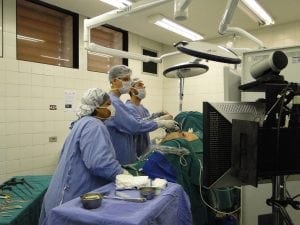According to a recent article, PharmaDrug Inc. revealed that their study of combining cepharanthine and chemotherapy to treat IND-enabling esophageal cancer has yielded positive results.
Esophageal Cancer
Esophageal cancer occurs in the tissues of the esophagus, which is a long, hollow tube that runs from the throat to the stomach. It helps move the food you swallow from the back of the throat to the stomach to be digested. The wall of the esophagus is made up of several layers of tissue. Esophageal cancer usually begins in the cells that line the inside of the esophagus, and then spreads outward through the other layers as it grows. There are various types of esophageal cancer, which affect a patient’s treatment options. The type of esophageal cancer is determined based on the type of cells that are involved. Types of esophageal cancer include:
- Adenocarcinoma: This type begins in cells that make and secrete mucus and is usually found in the lower portion of the esophagus. It is the most common form of esophageal cancer in the United States.
- Squamous cell carcinoma: This occurs in the squamous cells of the esophagus, which are flat and thin cells that line its surface. It is usually found in the upper and middle parts of the esophagus. It is the most common esophageal cancer found worldwide.
- Rare types: sarcoma, small cell carcinoma, lymphoma, melanoma, choriocarcinoma
It is estimated that esophageal cancer affects about 4 in 100,000 people per year. Males are more likely to get it than females. There is also a regional factor, as mentioned above. The risk of getting esophageal cancer may increase if a patient has or partakes in: smoking, excessive alcohol consumption, gastroesophageal reflux disease, Barrett’s esophagus, acid reflux, and obesity.
Symptoms:
Early stages of esophageal cancer usually show no symptoms. Later on, symptoms include but are not limited to:
- Painful or difficult swallowing
- Unintentional weight loss
- Chest pain, pressure, or burning
- Poor indigestion
- Heartburn
- Chronic coughing
- Hoarseness
- Bone pain
- Obstruction of the esophagus
The Studies
A series of cancer screening studies from PharmaDrug began in 2021 in the hopes of finding therapeutic uses for cepharanthine, whether that be with it by itself or alongside standard of care (SoC) chemotherapy drugs. The results of these studies found that cepharanthine had the most growth inhibition against esophageal cancer compared to all of the other cancer types that were screened.
The concentration that was determined to be the most effective in inhibiting 50% growth for esophageal cancer is 1.51 µM. This concentration has already been used and proven to be safe for treating humans.
In their esophageal cancer efficacy study, PharmaDrug found that an oral regimen of using PD-001 (Enteric-coated Oral Cepharanthine) in addition to paclitaxel once per day, significantly reduced tumor volume and improved tumor inhibition when dosing was complete. The scheduled dosing was comprised of 28 days post-implantation.
In PharmaDrug’s current study, paclitaxel was used as a positive control agent, and at the end of the 28 days, the tumor volume was found to be reduced by 53% compared to patients who were in the untreated control group. Researchers found that at the beginning of the study, paclitaxel enabled good tumor growth inhibition. However, in the second half of the study, the tumor growth rate was accelerated. This is an observation that has been noted in several clinical treatments of esophageal cancer patients.
The study further showed that using a dosage of 27mg/kg/day of PD-001 in combination with paclitaxel resulted in 41% tumor volume reduction improvements. Furthermore, the inhibition of tumor growth happened sooner when using this combination, sometimes occurring at only 17 days after implantation (40% greater than just paclitaxel) and peaking 20 days after implantation (84% better than just paclitaxel).
Overall, the results of the study determined that PD-001 in combination with paclitaxel yields positive results for patients with IND-enabling esophageal cancer. PharmaDrug believes that cepharanthine will continue to have more potential in treating various cancers and they will continue to find ways of expanding its use.
PharmaDrug Inc. is a pharmaceutical company that focuses on researching, developing, and commercializing controlled substances and naturally-derived approved drugs.








